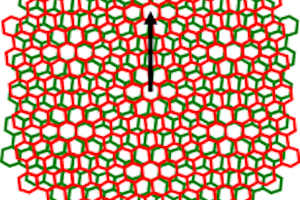Sep 18 2014
Researchers at the University of Manchester have demonstrated that lasers could be used to cool graphene by stacking special graphene sheets in a particular way. This would help cool graphene electronic devices allowing it to run faster, with better performance.
 The special graphene cools down when laser light is shone on it. Image credit
The special graphene cools down when laser light is shone on it. Image credit
Manchester University’s head of the Nano-functional Materials Group, Dr Aravind Vijayaraghavan, Professor Lukas Novotny from Zurich, and Professor Ado Jorio from Belo Horizonte took part in this project.
The researchers used sticky tape to make the special graphene flakes. Some of these flakes have straight edges that denote the direction of orientation of the atoms. Two such flakes of graphene were selected and aligned in a manner that their straight edges were at a fixed angle to each other. The laser light color influenced the angle to be maintained.
The scientists used ‘twisted bi-layer graphene’ that was made of two stacked graphene sheets. One of these sheets was twisted at an angle of 11.3° with reference to the other sheets. Usually, laser is used to heat, burn or melt metals. However, this kind of graphene has amazing properties. When a specific combination of laser energy (color) and twist angle is used, the graphene cools.
Atomic vibrations in materials store the heat. Atoms vibrate faster in hot materials than in cold materials. However, in twisted graphene, the atom’s vibration energy is absorbed by photons in the laser. This cools the graphene material.
This research holds promise for future graphene computers. Presently, cold water, air conditioning or liquid hydrogen is used to prevent computers from heating up. In future a laser can be focused on the graphene computer to cool it.